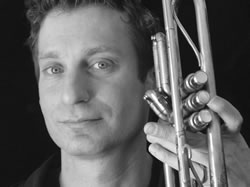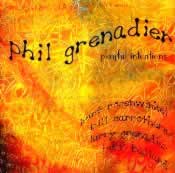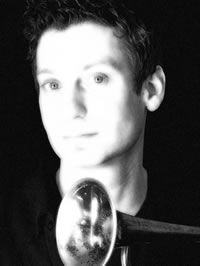| |
|

Phil Grenadier
Carlos
Pérez:
Your have recently published your second record (“Playful
Intentions”). What are its characteristics?
Phil Grenadier:
I feel it is a varied exploration by
the group of sound, texture and space. It is open and fresh, to me;
the musicians expressive and vital. We cover much territory, but I
feel this freedom and expression unifies the CD.
C.P.:
In this record, you wrote five of the compositions, and the rest are
versions of very mixed origins: only one standard (“Speak Low”),
two contemporary pop songs, a collective improvisation, a Bud Powell
composition, a Brad Mehldau song... Do you think that in general
standards are overuse in recordings? What value do you give to
standards?
P.G.: I love standards; plain
and simple. I love to play them and hear them, but I am acutely
aware that fresh approaches and outlooks are necessary after so many
amazing versions already given to us. I would like to record some
standards on a future CD; I think this may be where my strength is,
stretching and tearing at these standard tunes I love, but
“liberating” them and myself; almost rising above the material
so to make it “new” again. Sometimes I feel almost “old
fashioned” for feeling this way as my peers and critics are often
“down” on standards these days, but I have to do what I feel is
best for me at that time. Also, I’ll say that Brad Mehldau tune I
recorded, “At A Loss” could become a future standard.

C.P:
In your biography we can read
that when you were 16 you already played as a professional musician.
Does that mean that you are in part self-taught? What was your
musical training?
P.G.: I
come from a musical family. My father played trumpet in the army
band (WW2). I grew up with two brothers; we were all one year apart.
My Dad started us all on trumpet at ages 8,7 & 6, I being the
oldest (Actually we started on ukelele). I stuck with the trumpet,
while my brothers moved to guitar and bass. I studied technique with
a private trumpet teacher and played in as many bands as I could.
The three of us brothers played together and listened to Jazz
records constantly. We inspired and helped each other a great deal.
I’ve never studied music or improvisation in school, so in that
manner, I am self- taught; but have received so much advice and
schooling from musicians. We grew up in San Francisco, California ;
I was helped by so many there: Trumpeters John Coppola and Eddie
Henderson come to mind first; followed by band leaders Mark Levine
and Harvey Wainapel. When I left San Francisco for New York, I
treated NYC as my “music college”.
C.P.:
What importance has academicism in jazz?
P.G.: I am sure it has its value,
but I’m not the guy to extol its virtues!
C.P.:
Can a musician call himself a jazzman without knowing the jazz
tradition?
P.G.: Tough
question! I´d say "no", but words like "jazzman"
are just that; purely words and I feel words don´t capture what
music or jazz is... But improvisers exist everywhere; with or
without jazz and its traditions.
C.P: How can we define in history this jazz tradition? Some jazz fans think
that a lot of people, when they talk about jazz tradition, forget
consciously some periods like the free jazz, that was actually born
more than 40 years ago.
P.G.: Absolutely!
There is and has been so much music. This is quite complicated, but
I feel much gets oversimplified when categorizing music and creating
a history of the music. Much of the music of the past, people are
still trying to catch up to and come to grips with—like the
“free jazz” period or Miles in the 70’s for example. But all
these aspects, questions and concerns can be heard in our music of
today.
C.P.: Can you give us your own definition of jazz? What
are his essential elements?
P.G.: I’d
prefer not to. I think only improvisation as its essential element.

C.P.:
Do you think that if a musician studies too thoroughly some jazz
style or jazz musician he can loose his own personality? Is it
possible today to a jazz musician to have his own language?
P.G.: I
think that is certainly possible, but the lost personality is not
lost for good. Its still there, but one must search for it. I
definitely think it is possible today for a jazz musician to have
their own language. People like Steve Coleman, Mark Turner, Kurt
Rosenwinkel come to mind immediately, for me.
C.P.: Jazz has always look for new ways to develop the music. Is
it also true today? In which way?
P.G.: Jazz
today is developing in so many new and different ways. Its all out
there—tradition, avant garde, electro-acoustic improv, rock
influence, new sounds/ technologies, ethnic music---Man, its
remarkable! Different combinations abound---Musicians are still
searching and integrating our influences and visions.
C.P.:
You do very diverse collaborations. What are the musicians or the
projects that attract you more?
P.G.: I have to say I enjoy the diversity. From swinging
standards to free; it’s all good for me. I’m attracted to
musicians who are open and listen; that are in the moment, without
preconceptions. I love musicians that play the unexpected, avoiding
the cliché. I love a musician’s sound, feeling/spirit; and I love
space/breath… Projects that are open attract me more. Often, I
feel, a musician will create the CD in their head before hand; with
expectations in place---I prefer a more organic approach, where
things come together more in that moment in time when we’re in the
studio making the music. That’s just me though, as I know many
fantastic CDs are made the way I don’t prefer. I also love the
fact that I get to record in so many different settings. I’ve done
unique settings like trumpet,
bass, drums trio with a string quartet added; to quartets,
quintets, octets to a 51 piece group with Anthony Braxton. These
settings will attract me to a project as well.
C.P.:
Tell us about your future projects.
P.G.: Well
I’ve been doing a fair amount of sideman recording these days.
From Jason Lindner’s band to Anthony Braxton’s Ghost Trance
Music to a remarkable young Argentinian pianist ,Leo Genovese, which
we’ll do next week for Fresh Sound New Talent. I’ve been
traveling to Sweden, Norway, Costa Rica recently and hope to get
more opportunities to share my music around the world. I’m now
starting to get the itch to do my 3rd recording for Fresh
Sound New Talent recently, so I will be writing and planning for
that this year. I don’t exactly know what it’ll be about, but I’m
looking forward to that experience and opportunity. I always learn
so much from the recording experience—I am so thankful for Fresh
Sound founder, Jordi Pujol! I am blessed.
© Carlos Pérez Cruz, Tomajazz
2004
|
|
|

